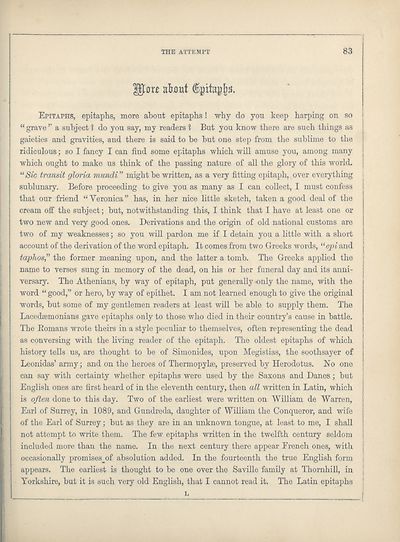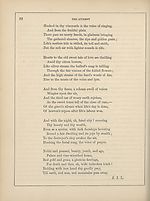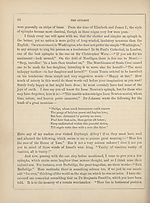Attempt > Volume 1 and Select writings
(95) Page 83
Download files
Complete book:
Individual page:
Thumbnail gallery: Grid view | List view

THE ATTEMPT
83
UtoM about <%itag|):s.
Epitaphs, epitaphs, more about epitaphs ! why do you keep harping on so
“ grave ’’ a subject 1 do you say, my readers i But you know there are such things as
gaieties and gravities, and there is said to be but one step from the sublime to the
ridiculous; so I fancy I can find some epitaphs which will amuse you, among many
which ought to make us think of the passing nature of all the glory of this world.
“Sic transit gloria mundi” might be written, as a very fitting epitaph, over everything
sublunary. Before proceeding to give you as many as I can collect, I must confess
that our friend “Veronica” has, in her nice little sketch, taken a good deal of the
cream off the subject; hut, notwithstanding this, I think that I have at least one or
two new and very good ones. Derivations and the origin of old national customs are
two of my weaknesses; so you will pardon me if I detain you a little with a short
account of the derivation of the word epitaph. It comes from two Greeks words, “epi and
taphos," the former meaning upon, and the latter a tomb. The Greeks applied the
name to verses sung in memory of the dead, on his or her funeral day and its anni¬
versary. The Athenians, by way of epitaph, put generally only the name, with the
word “ good,” or hero, by way of epithet. I am not learned enough to give the original
words, but some of my gentlemen readers at least will be able to supply them. The
Lacedasmonians gave epitaphs only to those who died in their country’s cause in battle.
The Bomans wrote theirs in a style peculiar to themselves, often representing the dead
as conversing with the living reader of the epitaph. The oldest epitaphs of which
history tells us, are thought to be of Simonides, upon Megistias, the soothsayer of
Leonidas’ army; and on the heroes of Thermopylae, preserved by Herodotus. Ho one
can say with certainty whether epitaphs were used by the Saxons and Danes; but
English ones are first heard of in the eleventh century, then all written in Latin, which
is often done to this day. Two of the earliest were written on William de Warren,
Earl of Surrey, in 1089, and Gundreda, daughter of William the Conqueror, and wife
of the Earl of Surrey; but as they are in an unknown tongue, at least to me, I shall
not attempt to write them. The few epitaphs written in the twelfth century seldom
included more than the name. In the next century there appear French ones, with
occasionally promises_of absolution added. In the fourteenth the true English form
appears. The earliest is thought to be one over the Saville family at Thornhill, in
Yorkshire, but it is such very old English, that I cannot read it. The Latin epitaphs
83
UtoM about <%itag|):s.
Epitaphs, epitaphs, more about epitaphs ! why do you keep harping on so
“ grave ’’ a subject 1 do you say, my readers i But you know there are such things as
gaieties and gravities, and there is said to be but one step from the sublime to the
ridiculous; so I fancy I can find some epitaphs which will amuse you, among many
which ought to make us think of the passing nature of all the glory of this world.
“Sic transit gloria mundi” might be written, as a very fitting epitaph, over everything
sublunary. Before proceeding to give you as many as I can collect, I must confess
that our friend “Veronica” has, in her nice little sketch, taken a good deal of the
cream off the subject; hut, notwithstanding this, I think that I have at least one or
two new and very good ones. Derivations and the origin of old national customs are
two of my weaknesses; so you will pardon me if I detain you a little with a short
account of the derivation of the word epitaph. It comes from two Greeks words, “epi and
taphos," the former meaning upon, and the latter a tomb. The Greeks applied the
name to verses sung in memory of the dead, on his or her funeral day and its anni¬
versary. The Athenians, by way of epitaph, put generally only the name, with the
word “ good,” or hero, by way of epithet. I am not learned enough to give the original
words, but some of my gentlemen readers at least will be able to supply them. The
Lacedasmonians gave epitaphs only to those who died in their country’s cause in battle.
The Bomans wrote theirs in a style peculiar to themselves, often representing the dead
as conversing with the living reader of the epitaph. The oldest epitaphs of which
history tells us, are thought to be of Simonides, upon Megistias, the soothsayer of
Leonidas’ army; and on the heroes of Thermopylae, preserved by Herodotus. Ho one
can say with certainty whether epitaphs were used by the Saxons and Danes; but
English ones are first heard of in the eleventh century, then all written in Latin, which
is often done to this day. Two of the earliest were written on William de Warren,
Earl of Surrey, in 1089, and Gundreda, daughter of William the Conqueror, and wife
of the Earl of Surrey; but as they are in an unknown tongue, at least to me, I shall
not attempt to write them. The few epitaphs written in the twelfth century seldom
included more than the name. In the next century there appear French ones, with
occasionally promises_of absolution added. In the fourteenth the true English form
appears. The earliest is thought to be one over the Saville family at Thornhill, in
Yorkshire, but it is such very old English, that I cannot read it. The Latin epitaphs
Set display mode to: Large image | Transcription
Images and transcriptions on this page, including medium image downloads, may be used under the Creative Commons Attribution 4.0 International Licence unless otherwise stated. ![]()
| Ladies' Edinburgh Debating Society publications > Attempt > Volume 1 and Select writings > (95) Page 83 |
|---|
| Permanent URL | https://digital.nls.uk/109866094 |
|---|
| Attribution and copyright: |
|
|---|

